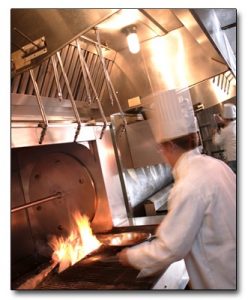
Restaurants are at a higher risk of a fire event than other business; here are restaurant-specific fire safety tips to keep the kitchen as safe as possible.
Restaurant kitchens are always at risk of a fire, so it’s essential to have the best preventative maintenance and fire safety protection equipment available. Open flames, hot cooking equipment, electrical appliances, cooking oils and cleaning chemicals are all risks for starting a devastating fire. Fire prevention and protection are crucial for all restaurants; take note of these few important tips for keeping your business safe from a fire.
Preventative Maintenance
Preventative maintenance is critical for every commercial business, as it is the best way to stop a fire event from occurring. Restaurant’s preventative maintenance includes fire-suppression systems, fire extinguishers, and keeping all equipment inspections and maintenance up-to-date.
- Automatic fire-suppression system: Over half of all restaurant fires involve cooking equipment, so installing an automatic fire-suppression system in the kitchen is extremely important. This system will automatically dispense chemicals to suppress a cooking fire and will shut down the fuel or electric supply to other cooking equipment in the kitchen when activated. The fire-suppression system should be inspected by a professional twice a year.
- Portable fire extinguisher: In addition to the fire-suppression system, every restaurant needs a portable fire extinguisher in case of emergencies. A kitchen should have a Class K extinguisher, as it is used specifically for kitchen fires involving grease, fats, and oils. Keep in mind that Class K extinguishers are only intended to be used after the activation of a built-in hood suppression system.
- Class ABC extinguisher: A restaurant should have Class ABC extinguishers (in rooms other than the kitchen) for any other fires that may occur, including paper, wood, or electrical.
- Maintenance and inspections: As with every business, a restaurant should schedule regular maintenance for all electrical equipment and be aware of any electrical fire hazards. Exhaust systems should also be regularly inspected for grease buildup. High-volume operations should be inspected quarterly, moderate-volume operations should be inspected semiannually, and exhaust systems serving soil-fuel cooking equipment should be inspected monthly.
Prepare Your Staff
Your staff should have proper fire prevention training to know how to best prevent a fire event from happening in your restaurant. Teach everyone how to use a fire extinguisher, how to store flammable liquids properly, and assign daily tasks to avoid fire hazards in the kitchen. For example, soiled rags and cardboard boxes should be disposed every day, and paper products, boxes, and food should be stored far away from any heat or cooking equipment. Also, having an emergency plan is essential in the event of a fire to keep your staff and customers as safe as possible.
Fire Prevention and Protection Services from Fireline
Whether you need smoke detectors, fire extinguishers, or an automatic sprinkler system installed at your rental property, Fireline has you covered. We have been protecting people and properties from fire damage since 1947—and our experience shows in our excellent work! We are known for our wonderful customer service, our expertise, and our reliability. For more information on how we can help your residential or commercial property, visit us online or give us a call at (800) 553-3405. For more fire safety tips, be sure to follow us on Facebook, Twitter, LinkedIn, and Google+.
